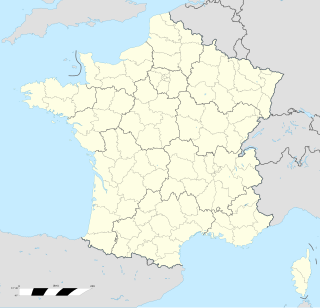The Gaulish name Bituriges, meaning 'kings of the world', can refer to:
- Bituriges Cubi, an ancient Gallic tribe dwelling around modern Bourges
- Bituriges Vivisci, an ancient Gallic tribe dwelling around modern Bordeaux
The Gaulish name Bituriges, meaning 'kings of the world', can refer to:
The Aedui or Haedui were a Gallic tribe dwelling in the modern Burgundy region during the Iron Age and the Roman period.

Vercingetorix was a king and chieftain of the Arverni tribe who united the Gauls in a failed revolt against Roman forces during the last phase of Julius Caesar's Gallic Wars. Despite having willingly surrendered to Caesar, he was executed in Rome.

The Arverni were a Gallic people dwelling in the modern Auvergne region during the Iron Age and the Roman period. They were one of the most powerful tribes of ancient Gaul, contesting primacy over the region with the neighbouring Aedui.

The Bituriges Cubi were a Gallic tribe dwelling in the later province of Berry during the Iron Age and the Roman period. They had a homonym tribe, the Bituriges Vivisci, in the Bordelais region, which could indicate a common origin, although there is no direct evidence of this.
The Carnutes or Carnuti, were a Gallic tribe dwelling in an extensive territory between the Sequana (Seine) and the Liger (Loire) rivers during the Iron Age and the Roman period.

The Senones or Senonii were an ancient Gallic tribe dwelling in the Seine basin, around present-day Sens, during the Iron Age and the Roman period.

The Turoni or Turones were a Gallic tribe of dwelling in the later Touraine region during the Iron Age and the Roman period.

The Pictones were a Gallic tribe dwelling south of the Loire river, in the modern departments of Vendée, Deux-Sèvres and Vienne, during the Iron Age and Roman period.

Avaricum was an oppidum in ancient Gaul, near what is now the city of Bourges. Avaricum, situated in the lands of the Bituriges Cubi, was the largest and best-fortified town within their territory, situated on very fertile lands. The terrain favored the oppidum, as it was flanked by a river and marshland, with only a single narrow entrance. By the time of the Roman conquest in 52 BC the city according to Julius Caesar had a population of 40,000 people.

Aigurande is a commune in the Indre department in central France.

The Petrocorii were a Gallic tribe dwelling in the present-day Périgord region, between the Dordogne and Vézère rivers, during the Iron Age and the Roman period.
Bellovesus is a legendary Gallic chief of the Bituriges, said to have lived ca. 600 BC. According to a legend recounted by Livy, the king Ambigatus sent his sister's sons Bellovesus and Segovesus in search of new lands to settle because of overpopulation in their homeland. While Segovesus headed towards the Hercynian Forest, Bellovesus is said to have led the Gallic invasion of northern Italy during the legendary reign of the fifth king of Rome, Tarquinius Priscus, where he allegedly conquered the Etruscans and founded the city of Mediolanum (Milan).

The Santoni or Santones were a Gallic tribe dwelling in the later region of Saintonge during the Iron Age and the Roman period.

The Tectosages or Tectosagii were one of the three ancient Gallic tribes of Galatia in central Asia Minor, together with the Tolistobogii and Trocmii.
The Aulerci were a group of Gallic peoples dwelling in the modern region of Normandy, between the Loire and the Seine rivers, during the Iron Age and the Roman period. They were divided into the Cenomani, the most powerful of them, the Eburovices, the Diablintes, and the Brannovices. The relationship that linked them together remains uncertain. According to historian Venceslas Kruta, they could have been pagi that got separated from a larger ethnic group of the pre-Roman period.

The Ambarri were a Gallic people dwelling in the modern Ain department during the Iron Age and the Roman period.

The Bituriges Vivisci were a Gallic tribe dwelling near modern-day Bordeaux during the Roman period. They had a homonym tribe, the Bituriges Cubi in the Berry region, which could indicate a common origin, although there is no direct of evidence of this.
The Tricastini were a small Gallic tribe dwelling in the modern Tricastin region, near present-day Saint-Paul-Trois-Châteaux, during the Iron Age and the Roman period.
The Nitiobroges were a Gallic tribe dwelling on the middle Garonne river, around their chief town Aginnon, during Iron Age and the Roman period.
The Gaulish name Cenomani can refer to: